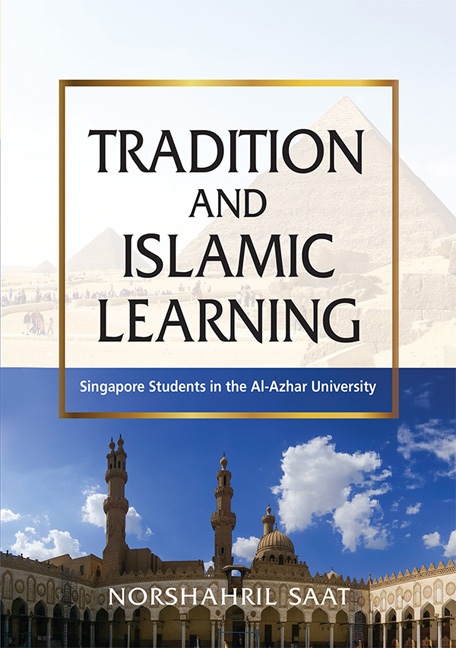Book contents
- Frontmatter
- Dedication
- Contents
- Preface
- Acknowledgements
- Abbreviations
- A Note on Translation, Spelling and Other Conventions
- Chapter 1 Introduction: Islamic Education and Religious Authority
- Chapter 2 The Al-Azhar University: A Historical Sketch
- Chapter 3 Prominent Southeast Asian Al-Azhar Graduates
- Chapter 4 Al-Azhar Today: The Experience of Singapore Students
- Chapter 5 Conclusion
- Bibliography
- Index
- About the Author
Chapter 1 - Introduction: Islamic Education and Religious Authority
Published online by Cambridge University Press: 04 July 2018
- Frontmatter
- Dedication
- Contents
- Preface
- Acknowledgements
- Abbreviations
- A Note on Translation, Spelling and Other Conventions
- Chapter 1 Introduction: Islamic Education and Religious Authority
- Chapter 2 The Al-Azhar University: A Historical Sketch
- Chapter 3 Prominent Southeast Asian Al-Azhar Graduates
- Chapter 4 Al-Azhar Today: The Experience of Singapore Students
- Chapter 5 Conclusion
- Bibliography
- Index
- About the Author
Summary
The definition of religious authority varies across different faith groups. In Christianity and Catholicism, there is a concept of ordained priesthoods. In Catholicism, the Pope is the highest religious authority, and a symbol of unity among the faithful. His centre of authority is in the Vatican, Rome. While priests and bishops serve as intermediaries between God and man, the same claim cannot be made about the ulama (Islamic religious scholars), though they also fulfil the role as providers of religious guidance on theological matters to the masses. In Islam, religious authority is decentralized; even the religious scholars in Islam's holiest city Mecca (Saudi Arabia) cannot claim to be the central authority of the Islamic world. When Muslims were living under the caliphate system, the Sultan was regarded as a political authority rather than a religious one.
Ulama refers to a learned group of men well versed in the Islamic religious sciences, and are moral guardians of faith and the gatekeepers of religion. The Quran, Islam's holiest scripture mentions the term ulama twice. A narration of the Prophet Muhammad referred to the group as waratsatul anbiya or the “heirs” of the Prophet. However, there are Muslims who prefer to treat the ulama as ideal social groups rather than referring to any specific individuals (Norshahril 2015). The ulama as a social group is a product of human construction, and not one that is divinely appointed. Ulama for one community may not be considered as one in another community. This begs the question as to who has legitimacy in the religious community to speak on theological matters. This contestation also exists within the same community, depending on which criteria the group holds. Some communities emphasize on knowledge as the most important marker that differentiates a religious scholar and a layperson, and hence, authority is measured based on the number of books the alim (singular for ulama) has written or the originality of his ideas. Yet, in other communities, a scholar must possess the ability to cure the sick, or in other words, magical powers. The alim must reflect some form of divine inspiration, even though of lesser degree compared to the Prophet Muhammad, who died in AD 632. According to the Islamic belief, the Prophet received divine orders (wahyu) directly from God.
- Type
- Chapter
- Information
- Tradition and Islamic LearningSingapore Students in the Al-Azhar University, pp. 1 - 14Publisher: ISEAS–Yusof Ishak InstitutePrint publication year: 2018



